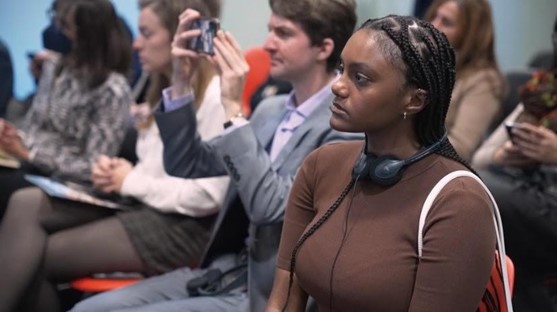In Search of a Better World: Why peacebuilding and conflict resolution should be front of mind for twenty-somethings
Sara Hagos March 28, 2023
Growing up as the daughter of Ethiopian immigrants in the Colorado suburbs was anything but ordinary. The complexity of navigating my dual identity and filling the gaps in my parents’ knowledge of a less-than-perfect American system started shaping my worldview at a young age. Hearing the stories of my family’s tribulations back home and simultaneously dealing with the fact that tragedies such as the Aurora movie theater shooting were happening so close to my childhood home not only made me think in a unique way, but fueled my anxieties about the world. Coping with a society that is increasingly violent and hateful has been extremely emotionally taxing but has furthered my desire to participate in the creation of a more peaceful world. From mediating playground disputes to navigating heated arguments with my brother over the TV remote, I, like many others, developed strong conflict-resolution skills early on because conflict is an inevitable part of life. While some are better equipped to handle it than others, we all face it at some point.

holding her bachelor’s degree she earned after
graduating from the University of Colorado Boulder
in the spring of 2022.
Being raised by two resilient parents who have faced unimaginable adversities and have come out of them with grace despite little to no help, has helped me acquire a deep-rooted appreciation for finding peaceful solutions and seeking justice for those who are most vulnerable and marginalized. With the help and support of the communities that have raised me, I’ve come to understand that instead of being consumed and dwelling on the countless instances of violence that occur both domestically and abroad, my energy is better spent exploring the root cause of it all. For years, in a conscious and unconscious effort, I have found myself asking why it is so difficult for communities, let alone the whole world, to coexist in peace. Why do individuals engage in behavior that can bring harm to themselves and others? Why is peace not the default in problem-solving? While all of these questions may be beyond my ability to answer, they serve as a driving force behind my effort to ultimately help make the world a better place.
Despite this burning desire to promote peace and make the world a more harmonious place, it would be untruthful of me to claim that I had a comprehensive understanding of peacebuilding and conflict resolution, either in academia or in practical application. Had you asked me three years ago, I probably would have oversimplified it by saying it’s all about ending wars, but this is far from the full picture. My initial exposure to peacebuilding and conflict resolution as a field was during my sophomore year of undergraduate through a course titled War, Peace, and Strategic Defense. This class taught me the necessary conditions that make for war and peace between countries and is the reason my academic focus during school narrowed in from a general interest in the foreign policy aspect of political science to advancing my understanding of conflict dynamics and finding equitable and efficient ways to solve conflicts. This concentration led me to pursue a certificate in Peace, Conflict, and Strategic Defense which allowed me to gain a deeper understanding of the multifaceted and cross-sectoral nature of peacebuilding and conflict resolution. In pursuit of furthering my interest, I took a leap of faith and applied for the Scoville Jr. Peace Fellowship, which I was fortunate to be awarded. Through this fellowship, I have gained invaluable first-hand experience at the renowned international NGO, Search for Common Ground. This opportunity has allowed me to work alongside a diverse range of stakeholders, including civil society, the U.S. Government, and other institutions, who are all committed to creating a better world in various ways.

During my time at Search for Common Ground, I have gained a much better understanding of the operational realities of peacebuilding in a way that has furthered my awe about the work being done in the field. Working on portfolios ranging from Women, Peace, and Security to Atrocity Prevention has provided me with a wealth of knowledge about pressing issues around the world and some pragmatic solutions to solve them. Witnessing and learning from the testimonies full of tenacity and empathy that guides fellow peacebuilding, especially those operating in conflict zones, has been truly inspiring. While I recognize that topics such as war, famine, and displacement have never been far-off abstract concepts to me, I firmly believe that all college students and twenty-somethings can benefit from the perspectives and skills offered by peacebuilding. The world desperately needs more individuals committed to promoting peace, and young people, in particular, have the potential and power to make a meaningful difference, no matter how small. And while dedicating your life’s work to peacebuilding and conflict resolution may not be one’s cup of tea, it’s important to remember that peacebuilding manifests from all aspects of life. No matter what you do, leading a life where justice, equity, and compassion – qualities central to peacebuilding – are front of mind, would make your world, and evidently the whole world a better place.
Sara Hagos is a Fall 2022 Scoville Fellow with Search for Common Ground.
